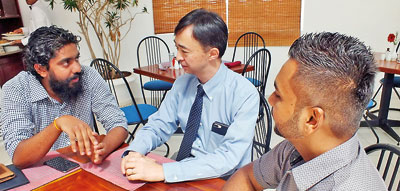New Sri Lankan factory to reuse and recycle electric vehicle batteries
While electric vehicle batteries when they are worn out are reused and recycled, in Sri Lanka this facility is not available for the electric vehicle owners as these vehicles are not imported through official agents. And since they are imported individually the Japanese manufacturer – Nissan doesn’t provide any such support.

Mr. Hiroshi Saitoh (centre) with Mr. Mahisanka Abeywickrama and Mr.Damith Gunatilleke.
There are about 5,000 electric vehicles in Sri Lanka whose owners have formed an association called the Electric Vehicles Club, Sri Lanka (EVC) and the club has been working to resolve this battery issue. They have been talking to Nissan and as a result of attempts of the club Nissan and another company, Sumisho Machinery Trade Corporation have floated a joint venture, 4R Energy which is now putting up a plant to make these worn out batteries reusable and recycled.
For the Sri Lankan electric vehicle owners to get the best out of the new factory, a Japanese – Hiroshi Saitoh, Deputy General Manager, Automotive Department No.2, Sumisho, was flown to Sri Lanka. He had discussions with the officials of the Electric Vehicle Club – Mahisanka Abeywickrama, Co-founder and Interim Committee member and Damith Gunatilleke, Chief Technical Officer, EVC. Mr. Saitoh was in Sri Lanka for three days and EVC also arranged a discussion with various connected parties.
When the Business Times met Mr. Saitoh, in the company of the two officials of EVC, he said that what they do in the factory is dismantle the used batteries and go through the components carefully to remove all the non-performing components to refabricate to construct a usable battery. All the bad components are removed for recycling. He said that when they are recycled, they would be released to the environment which is a great benefit.
He said that if the non-performing components are left in the battery, the performance of other performing components gets affected. The ‘re-use and recycling factory would commence operation in April this year.
Mr. Abeywickrama told the Business Times that the increased use of electric vehicles would benefit the country immensely because fossil fuel usage in the vehicles are reduced which is of benefit to the environment in addition to reducing fuel consumption.
Mr. Saitoh said that there are about 100,000 electric vehicles in Japan and to encourage more and more use of electric vehicles, the Japanese government offers financial support to ensure that the vehicles are used at least for six years and if this condition is violated the support would be withdrawn.


